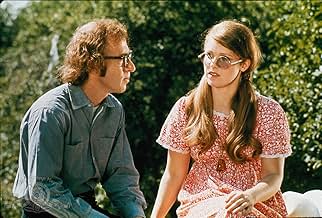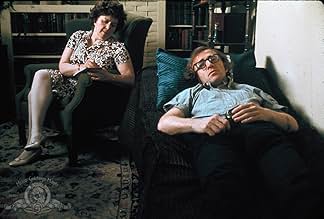VALUTAZIONE IMDb
6,9/10
39.318
LA TUA VALUTAZIONE
Quando un maldestro newyorchese viene scaricato dalla sua fidanzata attivista, si reca in una piccola nazione latinoamericana e viene coinvolto nella sua ultima ribellione.Quando un maldestro newyorchese viene scaricato dalla sua fidanzata attivista, si reca in una piccola nazione latinoamericana e viene coinvolto nella sua ultima ribellione.Quando un maldestro newyorchese viene scaricato dalla sua fidanzata attivista, si reca in una piccola nazione latinoamericana e viene coinvolto nella sua ultima ribellione.
- Premi
- 2 candidature totali
Nati Abascal
- Yolanda
- (as Natividad Abascal)
Miguel Ángel Suárez
- Luis
- (as Miguel Suarez)
René Enríquez
- Diaz
- (as Rene Enríquez)
Tigre Pérez
- Perez
- (as Tigre Perez)
Recensioni in evidenza
In the film's opening, sports commentators report on the assassination of the leader of San Marcos, an obscure South American country. Then, the reporters document the takeover of the country by the top general. its tragic and its funny. Meanwhile, Fielding Mellish (Woody Allen) tests products for a leading Manhattan manufacturer but has a hard time getting a date. Unbelievably, an erstwhile and attractive political activist, Nancy (Louise Lasser) comes to Fielding's door, wanting a signature for the condemnation of the San Marcos situation. After many attempts, Mr. Mellish gets a date and the two start a relationship. But, all too soon, Nancy breaks Fielding's heart, insisting he has no leadership qualities. Eureka! Fielding sets off for San Marcos, where he joins the rebels. Will he become the person Nancy wants? This hilarious look at the truly tragic volatility of some Western Hemisphere countries has many wonderful moments and lines. Allen and Lasser are the stars, while a cadre of little known folks blend in nicely. Naturally, the scenery in Manhattan contrasts hugely with those of the "tiny country to the south" while Allen's script is as priceless as ever and his direction is sure-fire. Want to laugh, laugh, laugh? Get Bananas.
This is one of Woody Allen's earliest movies, and I'd rank it probably 2nd out of his pre-Annie Hall movies, only behind Love and Death. It's certainly one of his funniest. The plot is pretty ridiculous (a neurotic product tester goes to the fictional San Marcos and ends up joining the rebels and eventually becoming president), but it's really secondary, and only serves to provide transitions from one comedy skit to another.
It's pretty much a hit and miss movie, but when he hits (which is more often than not), it's very funny. There are plenty of hilarious one liners throughout. The music is very cheesy as well, but it fits in well with the silly humor. Obviously, this isn't like Woody's later movies, just take it for what it is -- a silly comedy -- and I don't think you'll be disappointed.
Also of note, the opening credits are very funny and rivals Monty Python and the Holy Grail for best opening credits sequence.
It's pretty much a hit and miss movie, but when he hits (which is more often than not), it's very funny. There are plenty of hilarious one liners throughout. The music is very cheesy as well, but it fits in well with the silly humor. Obviously, this isn't like Woody's later movies, just take it for what it is -- a silly comedy -- and I don't think you'll be disappointed.
Also of note, the opening credits are very funny and rivals Monty Python and the Holy Grail for best opening credits sequence.
Woody Allen's second film as co-writer/director/star (not including "What's Up, Tiger Lily?") is a grab-bag of lunatic revue sketches, some of them hilarious. Spurned by his activist girlfriend, product-testing schnook in New York City quits his job and heads to a strife-ridden Latin American country to become a part of their revolution. Trenchant political satire must have looked outrageous in 1971, but time has made a few of these gags gruesomely topical and accurate (but no less funny). Targets include man-woman sexual matters (territory Allen was spot-on with right from the start), television commentary (sent up brilliantly), urban violence, Catholicism, psychiatry, assassinations, a Marx Brothers-styled courtroom, Miss America and...J. Edgar Hoover. The pacing seldom flags, but Allen's screenplay (penned with his "Take the Money and Run" partner, Mickey Rose) sags in the middle--perhaps he should have kept the action going in NYC a little longer. Terrific music score from Marvin Hamlisch, adept comedic work from the entire crazy cast (including deadpan Howard Cosell and Roger Grimsby as themselves). **1/2 from ****
By the time he got to Bananas, Woody Allen was reaching new heights in absurdist comedy. The idea of covering a South American revolution as a sporting
event certainly was original one. Even getting to the point of getting the voice
of American sports Howard Cossell to join the fun.
Allen is refining his schlepp persona in Bananas. Although he divorced his leading lady Louise Lasser in real life the two worked well together here. Allen tries to get a relationship going, but Lasser is interested in social causes. She has a bleeding heart for the people of the South American country of San Marcos and gives Woody his walking papers.
So off Allen goes to San Marcos as the schlepp from Brooklyn mixes with all kinds of folks there from dictator Carlos Montalban right down to the Che Guevara revolutionaries.
So many absurd moments in Bananas to count. My favorite is ordering takeout for the revolutionary army from a South American version of a Jewish delicatessen.
Definitely a must for Woody Allen.
Allen is refining his schlepp persona in Bananas. Although he divorced his leading lady Louise Lasser in real life the two worked well together here. Allen tries to get a relationship going, but Lasser is interested in social causes. She has a bleeding heart for the people of the South American country of San Marcos and gives Woody his walking papers.
So off Allen goes to San Marcos as the schlepp from Brooklyn mixes with all kinds of folks there from dictator Carlos Montalban right down to the Che Guevara revolutionaries.
So many absurd moments in Bananas to count. My favorite is ordering takeout for the revolutionary army from a South American version of a Jewish delicatessen.
Definitely a must for Woody Allen.
Bananas is like a cookie-batter of all of those early Woody Allen jokes all plopped into a bowl and shaken around. It's a film loaded with political jokes, but without a direct focus aside from Cuba and dictators and the like. There are numerous sexual jokes, including one of Woody's funniest scenes involving a magazine (the buying and holding on a subway, very silent comedy-like). And even Howard Cosell becomes an iconic figure in Woody's comedy in the brilliant opening scenes. The plot is very loose, so if you're looking for that look elsewhere. Also, to put it mildly, some of the jokes may not work at all for some viewers of today. But it's the go-for-broke irreverence of the picture that has it still worth viewing today. Much of Woody's own verbal bits are very good, but it's also worth to note how the physical comedy- while crude and a little off-key- also has a good ring to it. Unlike the director's later films, you can still sense that he's trying to 'get' how to make a film, and so in trying to do anything he can think of to get a laugh, of course, some of it doesn't work. For example, in Cuba the gag where the gargantuan pile of dung is carried down the stairs with the Lain music in the background gives a grin, but not as big a laugh as might be intended. Indeed, this might be Woody's most 'immature' film, while still containing some of his more biting, satirical jabs at dictators and oddball politics. Woody would still have this wild, go-for-broke style of humor more akin to some of his quirkier short stories in other films of the early 70s. While this isn't as successful in that regard as Sleeper or Love and Death, I'd still watch it again if it was on TV; even the romantic subplot, undercooked in comparison with the rest of the more satirical stuff, is interesting.
Lo sapevi?
- QuizSylvester Stallone appears uncredited as a subway thug. This was one of his earliest film roles, not a cameo. According to website Every Woody Allen Movie, "Allen initially sent Stallone back to the casting agency after deciding he wasn't 'tough-looking' enough. Stallone pleaded with him and eventually convinced him to change his mind".
- BlooperWhen Mellish accidentally injects everyone with sodium pentothal during an abduction on a street in San Marcos, there is a blue station wagon parked in front of them with a New York State license plate.
- Citazioni
Nancy: You're immature, Fielding.
Fielding Mellish: [whining] How am I immature?
Nancy: Well, emotionally, sexually, and intellectually.
Fielding Mellish: Yeah, but what other ways?
- Curiosità sui creditiIn the opening credits, the credits flash in time to the music. Additionally, the cards are shot with machine gun fire.
- ConnessioniFeatured in The Dick Cavett Show: Woody Allen (1971)
- Colonne sonoreQuiero La Noche
Words and music by Marvin Hamlisch
Sung by The Yomo Toro Trio
[Played during the opening titles and credits]
I più visti
Accedi per valutare e creare un elenco di titoli salvati per ottenere consigli personalizzati
- How long is Bananas?Powered by Alexa
- Why is the film titled "Bananas"?
Dettagli
Botteghino
- Budget
- 2.000.000 USD (previsto)
- Lordo in tutto il mondo
- 136.200 USD
Contribuisci a questa pagina
Suggerisci una modifica o aggiungi i contenuti mancanti

Divario superiore
By what name was Il dittatore dello stato libero di Bananas (1971) officially released in India in English?
Rispondi






























